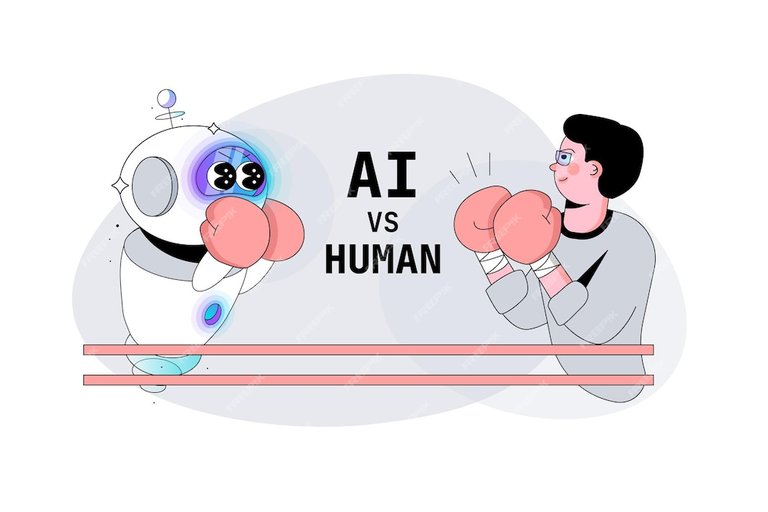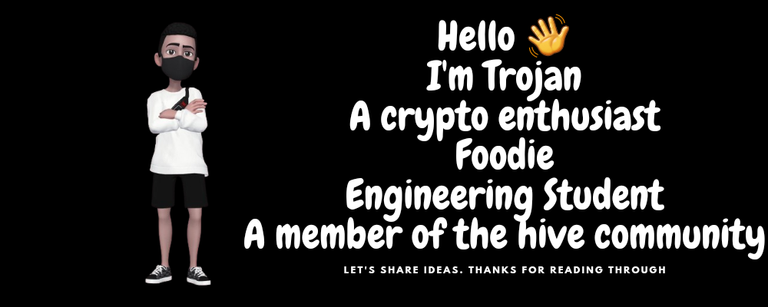English
We have all seen many movies in which AI takes over the world and tries to eliminate humans. Movies like Terminator show the future danger in this technology but it seems like we are all turning deaf ears to it. I haven't gone to the future myself to check this out, I'm just saying that AI technology is vast and we need to be careful.
However, the idea of AI has been in existence for a while now but we failed to recognize it, the number one is the calculator.
WHAT IS AN AI?
According to Britannica,
Artificial intelligence (AI), is the ability of a digital computer or computer-controlled robot to perform tasks commonly associated with intelligent beings.
In today's article, I will be talking about some of the major flaws in AI that make humans better than machines. These flaws are not what can be computed to technology and even though some things make AI better, these flaws will prevent AI from being able to do everything.
Spanish
Todos hemos visto muchas películas en las que la IA se apodera del mundo e intenta eliminar a los humanos. Películas como Terminator muestran el peligro futuro de esta tecnología pero parece que todos estamos haciendo oídos sordos. No he ido al futuro para comprobar esto, solo digo que la tecnología de inteligencia artificial es enorme y debemos tener cuidado.
Sin embargo, la idea de la IA existe desde hace un tiempo pero no pudimos reconocerla, el número uno es la calculadora.
¿QUÉ ES UNA IA?
Según la Británica,
La inteligencia artificial (IA), es la capacidad de una computadora digital o un robot controlado por computadora para realizar tareas comúnmente asociadas con seres inteligentes.
En el artículo de hoy, hablaré sobre algunos de los principales defectos de la IA que hacen que los humanos sean mejores que las máquinas. Estos defectos no son lo que se puede calcular con la tecnología y, aunque algunas cosas mejoran la IA, estos defectos impedirán que la IA pueda hacerlo todo.

It is common knowledge that a machine can do a lot more than humans.
While growing up, we were taught that a machine is a device that makes work easier and faster. So just like a tractor and other machines, the AI is also able to make work easier and faster. Below are more reasons why AI is needed in our lives and why it needs to be infused into our technology.
AI and humans each have their strengths and weaknesses, and there are certain tasks or attributes where AI excels compared to humans, and vice versa. Here are some aspects to consider:
Speed and Efficiency: As I said earlier, AI can process large amounts of data and perform simple and intense calculations much faster than we humans. No matter how complex, AI can outperform humans faster and capable of accomplishing any task with ease.
Accuracy: AI can be incredibly accurate when trained and tested properly. In tasks like image recognition, speech recognition, or data analysis amongst others, AI can also achieve higher levels of accuracy than humans without human errors.
Memory: AI systems can store and recall vast amounts of information with perfect accuracy, whereas human memory is fallible and limited.
Monotony and Repetition: AI doesn't tire or get bored, making it well-suited for tasks that are repetitive or monotonous, which might cause humans to lose focus or efficiency over time.
Objective Decision Making: AI can make decisions based solely on data and predefined algorithms, without being influenced by emotions, biases, or external factors that may affect human decision-making.
However, there are areas where humans still excel:
Ingenuity and Innovation: Humans can think creatively, imagine new ideas, and innovate in ways that AI cannot. Creative fields such as art, music, literature, and invention rely heavily on human originality.
Emotional Intelligence: Humans possess emotional intelligence, the ability to understand and empathize with others, which is currently beyond the capabilities of AI. This is crucial in areas such as counseling, therapy, negotiation, and interpersonal communication.
Contextual Understanding and Adaptability: Humans can adapt to new situations, and understand context in a way that AI finds it difficult with. Human's ability to know something without having to consciously think about it and common sense play significant roles in decision-making in uncertain or unexpected situations.
Ethical and Moral Judgment: Humans can make subtle ethical and moral judgments based on complex considerations, whereas AI operates solely based on already written out rules and objectives. Ethical puzzles, moral reasoning, and understanding societal norms are areas where humans excel.
In conclusion, while AI has made significant advancements and outperforms humans in certain tasks, there are still many areas where humans possess unique strengths that AI cannot replicate. The ideal scenario often involves depending on the strengths of both AI and humans in supportive ways.
Es bien sabido que una máquina puede hacer mucho más que los humanos.
Mientras crecíamos, nos enseñaron que una máquina es un dispositivo que hace que el trabajo sea más fácil y rápido. Así, al igual que un tractor y otras máquinas, la IA también puede hacer que el trabajo sea más fácil y rápido. A continuación se presentan más razones por las que la IA es necesaria en nuestras vidas y por qué es necesario incorporarla a nuestra tecnología.
La IA y los humanos tienen sus fortalezas y debilidades, y hay ciertas tareas o atributos en los que la IA sobresale en comparación con los humanos, y viceversa. Aquí hay algunos aspectos a considerar:
Velocidad y eficiencia: Como dije antes, la IA puede procesar grandes cantidades de datos y realizar cálculos simples e intensos mucho más rápido que los humanos. No importa cuán compleja sea, la IA puede superar a los humanos con mayor rapidez y es capaz de realizar cualquier tarea con facilidad.
Precisión: la IA puede ser increíblemente precisa cuando se entrena y prueba adecuadamente. En tareas como el reconocimiento de imágenes, el reconocimiento de voz o el análisis de datos, entre otras, la IA también puede alcanzar niveles de precisión más altos que los humanos sin errores humanos.
Memoria: los sistemas de inteligencia artificial pueden almacenar y recuperar grandes cantidades de información con perfecta precisión, mientras que la memoria humana es falible y limitada.
Monotonía y repetición: la IA no cansa ni aburre, lo que la hace muy adecuada para tareas repetitivas o monótonas, que pueden hacer que los humanos pierdan concentración o eficiencia con el tiempo.
Toma de decisiones objetiva: la IA puede tomar decisiones basadas únicamente en datos y algoritmos predefinidos, sin verse influenciada por emociones, sesgos o factores externos que puedan afectar la toma de decisiones humana.
Sin embargo, hay áreas en las que los humanos todavía sobresalen:
Ingenio e innovación: los humanos pueden pensar creativamente, imaginar nuevas ideas e innovar de maneras que la IA no puede. Los campos creativos como el arte, la música, la literatura y la invención dependen en gran medida de la originalidad humana.
Inteligencia Emocional: Los humanos poseen inteligencia emocional, la capacidad de comprender y empatizar con los demás, que actualmente está más allá de las capacidades de la IA. Esto es crucial en áreas como el asesoramiento, la terapia, la negociación y la comunicación interpersonal.
Comprensión contextual y adaptabilidad: los humanos pueden adaptarse a nuevas situaciones y comprender el contexto de una manera que a la IA le resulta difícil. La capacidad del ser humano para saber algo sin tener que pensar conscientemente en ello y el sentido común desempeñan un papel importante en la toma de decisiones en situaciones inciertas o inesperadas.
Juicio ético y moral: los humanos pueden emitir juicios éticos y morales sutiles basados en consideraciones complejas, mientras que la IA opera únicamente basándose en reglas y objetivos ya escritos. Los acertijos éticos, el razonamiento moral y la comprensión de las normas sociales son áreas en las que los humanos sobresalen.
En conclusión, si bien la IA ha logrado avances significativos y supera a los humanos en ciertas tareas, todavía hay muchas áreas donde los humanos poseen fortalezas únicas que la IA no puede replicar. El escenario ideal a menudo implica depender de las fortalezas tanto de la IA como de los humanos para brindar apoyo.
